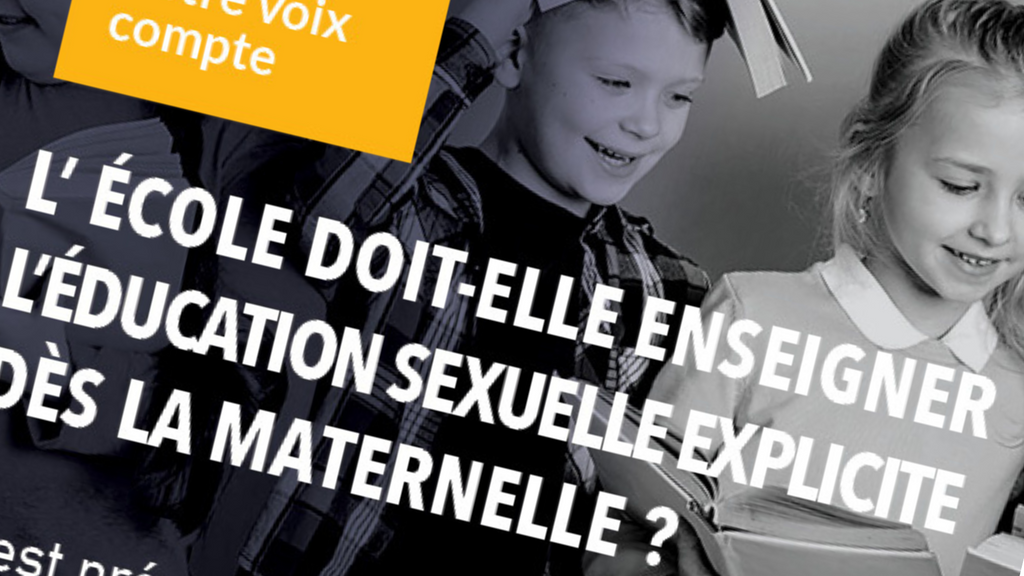Participative democracy or subversive misinformation? Up to 500,000 leaflets have been posted to Belgian homes in recent weeks, inviting Belgians to have their say on the new compulsory emotional and sexual education EVRAS policy.
But who is responsible for these leaflets, and are they in fact cleverly disguised misinformation? Published under the name of Démocratie Participative (Participative Democracy), the leaflets were first distributed among participants of a protest on 7 September against the EVRAS policy in front of the Parliament of the French Community (FWB).
Protestors, primarily from Islamic religious organisations, denounced the plan as an affront to their religious rights and decried the “hypersexualisation” of children in Belgian schools. The leaflets from Démocratie Participative were circulated, asking concerned parents to fill in a “survey” about the planned education.
But despite claims to be a citizens movement and an “open” and “self-funded” collective, the website of Démocratie Participative offers very little indication of its true identity. No such organisation is registered with the Official Belgian Gazette. At time of publication, the group's website claims that the survey received over 34,000 responses from Belgians on their opinions on EVRAS.
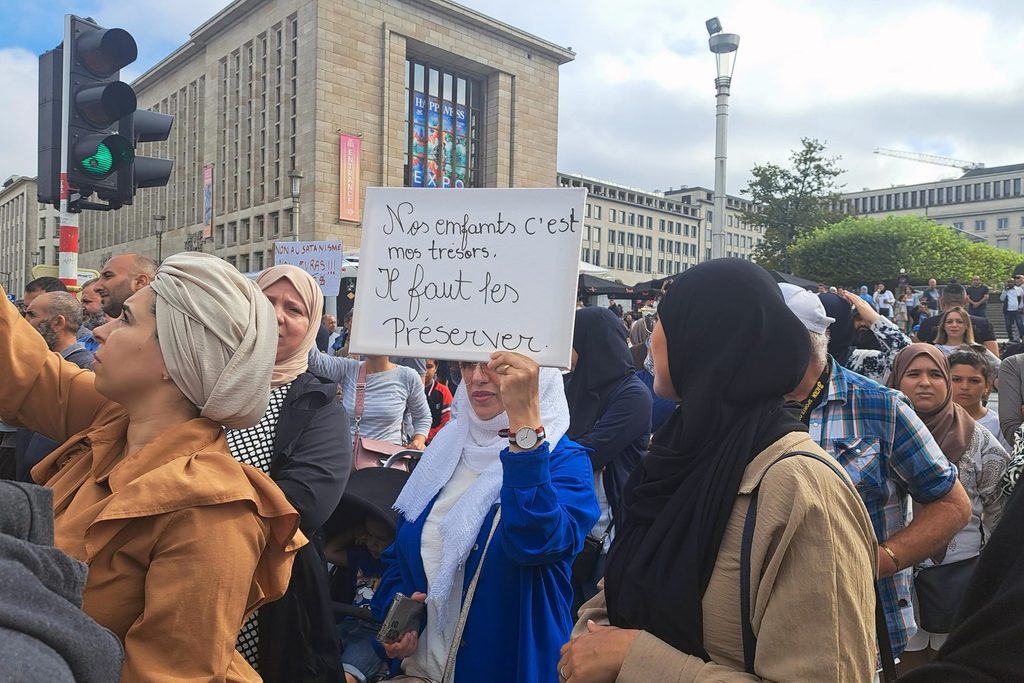
Protestors have come out strongly against the EVRAS policy, which ministers say has been misrepresented and subject to conspiracy theory. Brussels, Sunday 17 September 2023. Credit: Belga / Timon Ramboer
Website metadata reveals that the survey started as far back as July. However the site offers no transparency on how the data is used or stored, or any guarantees that the survey results published by Démocratie Participative are authentic.
Furthermore, there are no controls to authenticate that those who complete the survey are real people. Emails are not immediately verified and the form allows users to respond numerous times. Unsurprisingly, 92.3% of respondents said that they were "worried" by EVRAS.
The shadows of conspiracy
As such, the campaign can hardly be read as an accurate measure of public opinion on the new compulsory education. But as a means of spreading misinformation about the EVRAS programme, it has already reached thousands of targets online. Moreover, a closer investigation reveals the site has close links to the anti-vaxx community and online conspiracy theories.
Only one name, put in fine print on the website and leaflets, reveals who started the survey – Brussels resident Daniel de Wolff. The Belgian is an active member of the Belgian anti-vaccine movement and leads "Zone Libre", a "citizens initiative" aimed at fostering vaccine scepticism and fundraising for anti-vaccine leafleting campaigns.
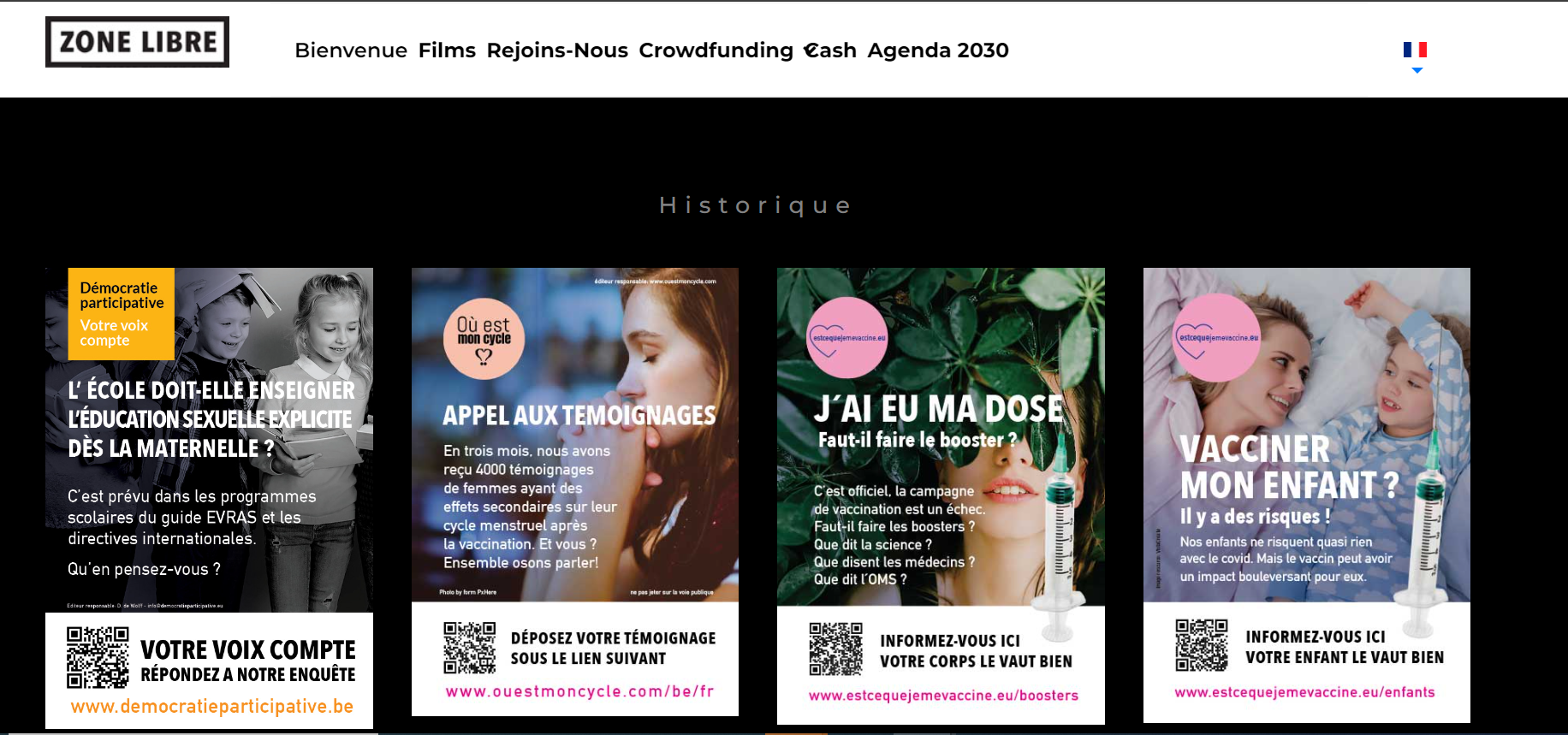
Credit: Screengrab/Zone Libre
The group’s official Telegram channel evokes the "great reset" in which a world government is conspiring to create "an open-air prison, surveillance, policing, social credit system, and deconstruction at the individual, municipal, and national level."
In May, de Wolff was prosecuted for hosting a website dedicated to Covid misinformation. The court ordered De Wolff to remove his website but Free Zone lodged an appeal and won, with the website appearing under a new domain in July.
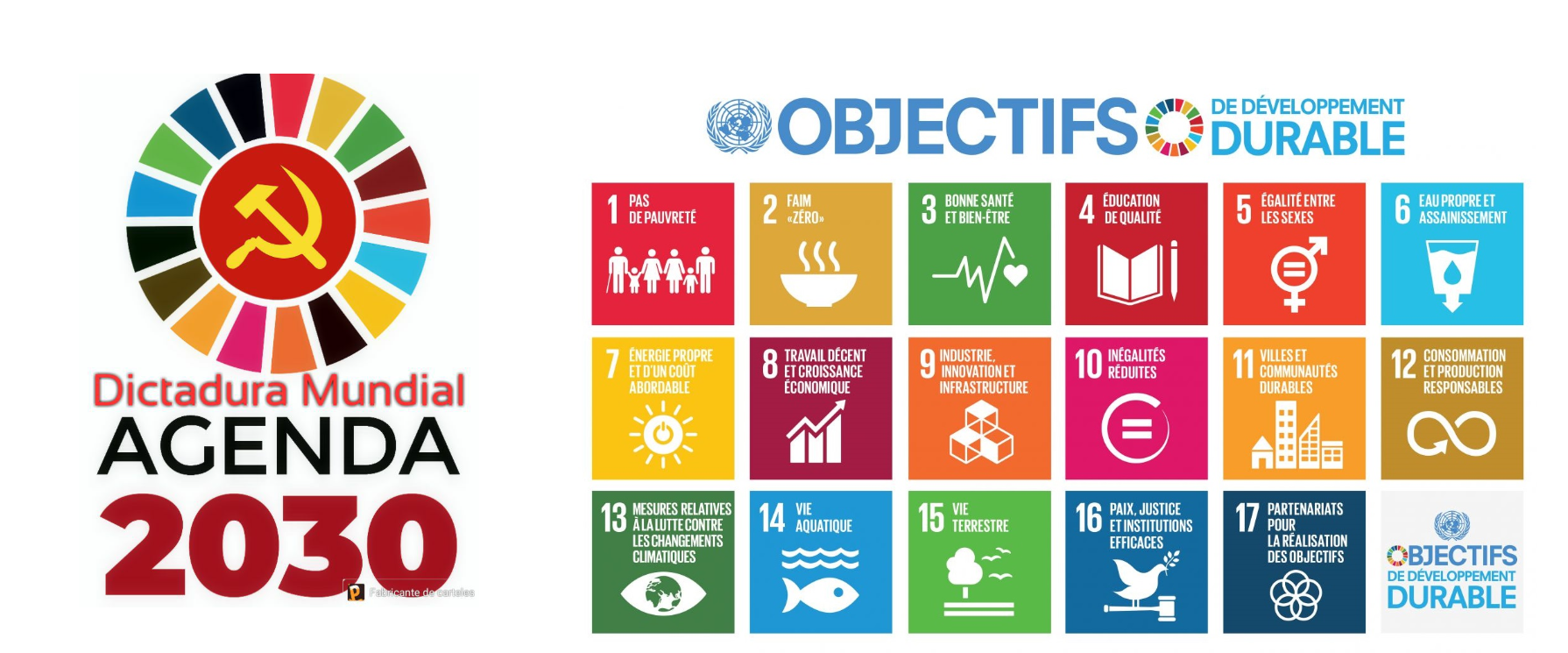
Credit: Screengrab/Zone Libre
Contacted by The Brussels Times, Daniel De Wolff states that Zone Libre was established in 2021 in opposition to the vaccination passport. Comprised of 500 members, he rejects the group's classification as an anti-vaxx group. "We follow the principles of science and common sense, without political orientation, in the defence of our fundamental rights and respect for the constitution," De Wolff insisted.
Zone Libre distances itself from the recent wave of arson attacks against schools, speculating that the incidents of being a "false flag attack" to make the EVRAS opposition look bad. No evidence supports this claim.
Banking on deception
The group claims to have raised over €3,700 to print 500,000 leaflets related to the Covid vaccine and its side effects. As early as January, the group began to raise funds to print another half a million leaflets in opposition to EVRAS.
Raising money through bank transfers to a nameless account – and later to De Wolff’s private account – the group appeals for funds to "re-inform our neighbours and the rest of the population", notably about the "sexualisation of children'', which it declares to be its "most urgent priority".
This is a far cry from Démocratie Participative’s stated intention to be a "non-partisan" movement to collect information to act as "an independent source of information." Both the leaflets and questions asked in the survey lean towards disinformation rather than a genuine effort to gauge public opinion.
"Our general approach is to ask questions to make people think for themselves and use their common sense," De Wolff defended. "[It] intends to measure if the political decision is supported by the voter."
What is EVRAS?
EVRAS stands for "Education à la Vie Relationnelle, Affective et Sexuelle," (Education in Relational, Emotional and Sexual Life) and it is the newly updated policy on sexual education in Belgium's French-speaking community.
The policy aims to harmonise teaching levels across schools by mandating that all pupils in certain age groups receive at least two hours of instruction during the academic year. Specifically, students will have two hours of sexual education in 6th grade (ages 11-12) and another two hours in 4th grade (ages 15-16). These classes will be taught by specially trained educators.
The policy change is significant because, until now, schools under Belgium's French-speaking administration had the discretion to decide whether to carry out sexual education classes, unlike in Dutch-speaking schools where it is already mandatory.
EVRAS training courses have existed since 2012 in Belgium. The course does not cover exclusively sexual relations, but also relational and emotional life. Topics can include managing emotions, self-esteem, the role of family, and dealing with loss.
The new educational textbook is simply a guide on how to deal with topics that arise in class, especially from questions from students, and that teachers are not made to teach any topic which would clearly be inappropriate. It is unlikely that the entirety of the text will ever be seen by the students.
Instructors will never take the initiative to introduce sexually charged topics, such as pornography or other topics, without having first been asked by pupils. The context of the textbook is also not fixed and may evolve over time.
The leaflet was massively distributed in the run-up to a wave of violence that saw schools targeted by arson attacks, apparently carried out by anti-EVRAS protestors. In the leaflet, Démocratie Participative refers to EVRAS as exclusively aimed at sexual education and suggests that kindergarteners would receive sexual education.
In reality, this is not the case – the EVRAS materials are only meant to serve as a guide to respond to questions that may arise from the children themselves. Ministers have repeatedly stressed that the programme has been subject to a scaremongering campaign, also highlighting that sexual education is just a small part of the course, which also focuses on relations and feelings.
"90% of the [EVRAS] document is fine," De Wolff argues. "But 10% is problematic. We have concentrated our questions on the S of EVRAS, on this contentious area. We cite phrases from the guide and ask what people think about it. It is well sourced."
The group says that the results of its survey are real. While not an official government survey with ID controls, it says that it screens for false names and emails. De Wolff automatically signs those who fill in the survey up to Démocratie Participative newsletter. Wolff has sent to the results to Belgian Prime Minister Alexander De Croo.
Nonetheless, the flyers likely encouraged significant alarm among some parents. The survey itself makes a series of misleading statements about EVRAS, presenting them as objective fact. Notably, it frequently makes reference to "plans to talk about" subjects, especially masturbation. The guide claims that this would be actively discussed with 9-year-olds.
False information
In reality, the EVRAS guided instruction will only be given to pupils in the 6th grade (ages 11-12) and 4th grade (15-16). Claims that it will teach masturbation have been strongly denied by teachers and ministers.
Other baseless allegations spread by Démocratie Participative say that children as young as 12 would be taught forms of consent such as prostitution or sexual favours. In reality, EVRAS only provides guidance on how to resist peer pressure and promote privacy, rather than encouraging sexual promiscuity.
The survey makes a series of misleading claims, repeatedly presenting the subjects included in the guide as strict guidelines to education, rather than exceptional topics that might be occasionally asked by students, or examples intended to reinforce privacy and consent.
For more information about EVRAS see here.
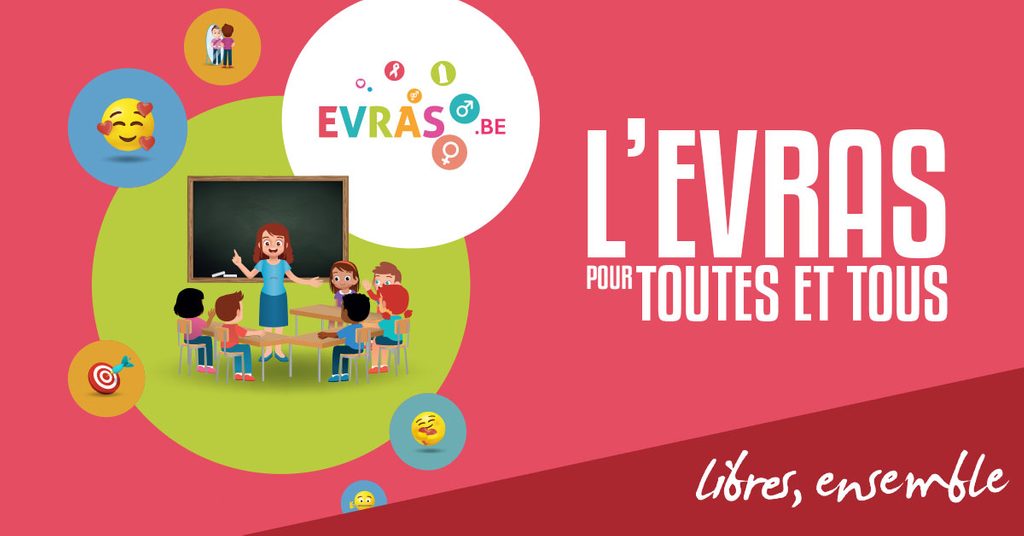
Credit: Centre d'action Laique
With the success of his survey, De Wolff has gained new followers and, notably, money to fund his own "alternative" media, called "Zèbre". According to RTBF, the new media is in fact a rebranding of an existing pseudoscientific publication named Biotempo. Zèbre claims to have already fundraised over €38,000 towards the new publication.
De Wolff now uses this platform to spread misleading information about EVRAS to his growing audience. Under the new platform, he has conducted a number of interviews with figures responsible for inciting much of the hysteria behind recent anti-EVRAS protest.
These interviews contain numerous misleading statements, notably in relation to accusations of a paedophilic conspiracy and that the EVRAS guide would teach children to masturbate or consume pornography.
Opposition to EVRAS is unlikely to slow. Another large mobilisation against the new compulsory education is scheduled for 30 September in Brussels.

